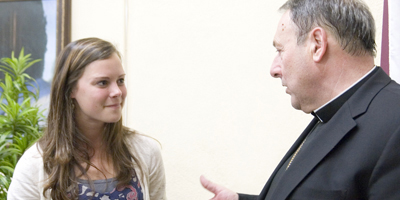
 CHARLESTON—Bishop Robert E. Guglielmone spoke to the Cathedral of St. John the Baptist young adults group recently about the role they play to help unify the church.
CHARLESTON—Bishop Robert E. Guglielmone spoke to the Cathedral of St. John the Baptist young adults group recently about the role they play to help unify the church.
The group for people ages 18 to 35 holds a monthly educational “Why Catholic?” meeting at the Pauline Books and Media Center on King Street.
Paul Reetz, 27, and some friends helped form the group about three years ago. He had moved from Minnesota and could not find any Catholic organization for people their age.
Reetz and Cody Groeber, 30, began with Bible studies at the center. They now meet for study every other Wednesday, hold the educational meeting and social events.
“It provides a place for young adults who want to actively live their faith,” Groeber said. “It’s a serious, inquisitive exploration of our faith.”
Mike Adams, 26, enjoys the fellowship. He found out about the group when he overheard one of the Pauline sisters talking about it at the bookstore. He said he was eager to hear what the bishop had to say in his March 31 talk.
What Adams discovered is that Bishop Guglielmone thinks young adults should actively participate in parish life and let their opinions be known.
“Just not on your way out the door after Mass,” the bishop said.
He urged them to join parishes and nourish their faith with prayer. He addressed topical issues such as clerical sexual abuse, the need for improved ministry to Hispanics, and the necessity for Catholics to bond.
Bishop Guglielmone also reflected on his year as leader of the Diocese of Charleston and what he believes his role involves. He said he must foster the sanctity of God’s people, especially in terms of sacramental life; make sure priests are properly prepared and disposed to their vocation; prepare people for the vocation of marriage; provide opportunities for faith communities to grow; provide education for people at every age; provide outreach to the poor, sick, and imprisoned; foster the ecumenical movement; provide competent leadership and adequate stewardship of the resources of God’s people; and maintain fraternal relationships with other bishops and the pope.
“Lastly, most important is my responsibility as bishop to try to develop a sense of unity among all of God’s people here …” he said.
“I do not mean uniformity,” the bishop continued. “Obviously if you look at Catholic churches and go from one to another to another you will see that there is not a sense of uniformity. The way worship is celebrated might be quite different.”
He gave as an example a description of his visit to St. James Church in Walterboro for a black Catholics caucus. At Mass, the bishop said the congregation was “singing the roof off that building,” clapping and swaying. The next day he was at the Cathedral in Charleston with incense and Gregorian chant.
“Wow, what a contrast,” he said. “No uniformity except this is my body this is my blood. The same set of scripture readings but the expression of the faith is so different and both of them were valid expressions, beautiful expressions.”
Though Catholics are not uniform in the way they express their faith, unity is necessary.
“Unity has to do with the heart, with the mind,” Bishop Guglielmone said. “I can look at my brother or my sister and see that they have a little different approach than I have but yet can respect them. Argue with them if necessary, but respect them. We live, I think, in a society where that’s very difficult. … We’ve lost the sense that we can disagree, we can have different opinions, but we have to be civil. We have to respect one another.”
He mentioned how some people think Mass should only be celebrated in English while others say only Latin.
“We can go on and on in terms of the differences, but do we have a sense of unity, common purpose?” he asked. “Do we recognize that Jesus told us our main task — the last words he spoke to his disciples before he ascends into heaven — is go and teach them everything I taught you?
“Go and baptize them in the name of the Father and the Son and the Holy Spirit. That’s our task. He never told us what language we should celebrate Mass in. He never told us that there was a certain way to do this, a certain way to do that.”
